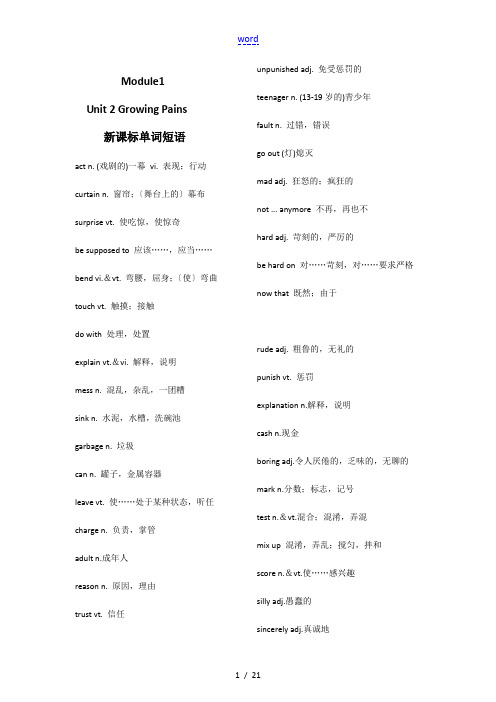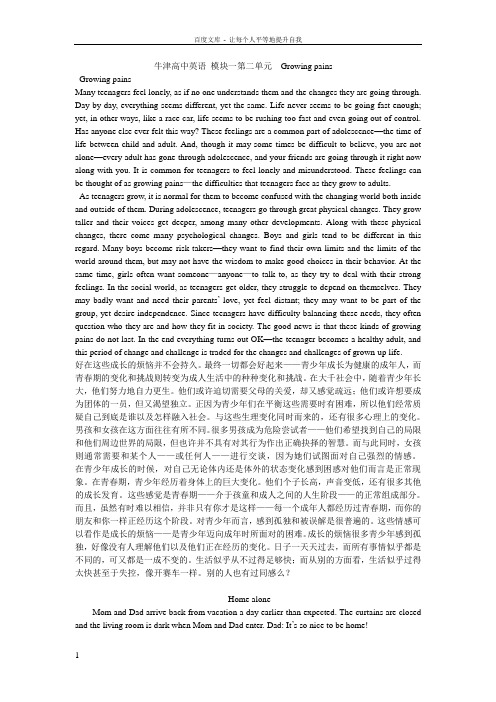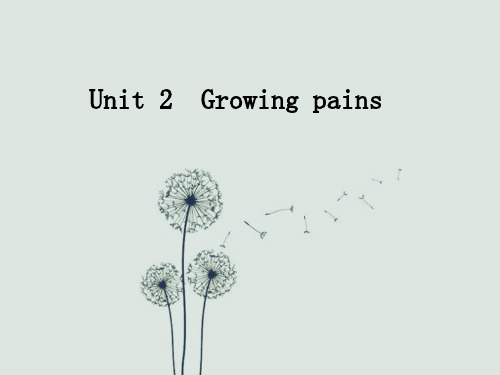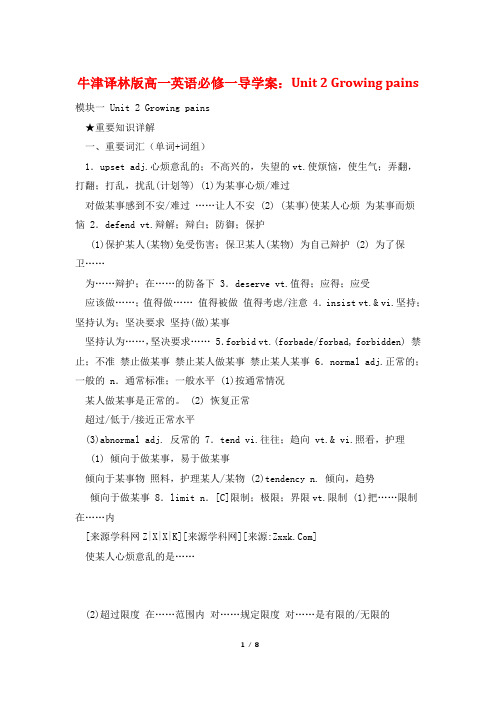growing pains
牛津译林版必修一 Unit 2 Growing Pains

Module1Unit 2 Growing Pains新课标单词短语act n. (戏剧的)一幕vi. 表现;行动curtain n. 窗帘;〔舞台上的〕幕布surprise vt. 使吃惊,使惊奇be supposed to 应该……,应当……bend vi.&vt. 弯腰,屈身;〔使〕弯曲touch vt. 触摸;接触do with 处理,处置explain vt.&vi. 解释,说明mess n. 混乱,杂乱,一团糟sink n. 水泥,水槽,洗碗池garbage n. 垃圾can n. 罐子,金属容器leave vt. 使……处于某种状态,听任charge n. 负责,掌管adult n.成年人reason n. 原因,理由trust vt. 信任unpunished adj. 免受惩罚的teenager n. (13-19岁的)青少年fault n. 过错,错误go out (灯)熄灭mad adj. 狂怒的;疯狂的not ... anymore 不再,再也不hard adj. 苛刻的,严厉的be hard on 对……苛刻,对……要求严格now that 既然;由于rude adj. 粗鲁的,无礼的punish vt. 惩罚explanation n.解释,说明cash n.现金boring adj.令人厌倦的,乏味的,无聊的mark n.分数;标志,记号test n.&vt.混合;混淆,弄混mix up 混淆,弄乱;搅匀,拌和score n.&vt.使……感兴趣silly adj.愚蠢的sincerely adj.真诚地as though 好像,似乎insist on 坚持,坚持认为charge n. 负责,掌管adult n.成年人reason n. 原因,理由trust vt. 信任unpunished adj. 免受惩罚的teenager n. (13-19岁的)青少年fault n. 过错,错误go out (灯)熄灭mad adj. 狂怒的;疯狂的not ... anymore 不再,再也不hard adj. 苛刻的,严厉的be hard on 对……苛刻,对……要求严格now that 既然;由于cafe n.咖啡馆,小餐馆Internet cafe 网吧chat vt.&n.聊天,闲谈valuable adj.时间段,时期,阶段at present 目前,当前argument n.争论,辨论;论点,论据freedom n.自由relationship n.关系mainly adv.主要地;大体上suggest vt.建议;暗示,使想起fight vi.争吵,争论;打架,争斗crazy adj.发疯的,疯狂的like crazy 发疯似地,拼命地spare adj.空闲的;多余的selfish adj.自私的unloving adj.缺乏爱心的forbid vt.禁止Truly adv.真诚地;真实地课文出现短语1. turn up2. a waste of time3. try to do sth4. force sb to do sth5. spend time (in) doing sth6. be supposed to do sth7. in charge8. shout at9. give sb a chance to do sth10. deserve to do sth11. instead of12. be hard on sb13. now that14. be rude to sb15. feel like doing sth16. be different from sth17. in the form of18. pay attention to 19. think of20. search…for21. a little bit22. be proud of23. stay up24. mix up…with25. ask for sth26. stop doing sth27. mean to do sth28. keep in mind29. tidy up30. be angry with31. clean up32. a bit of33. at all34. invite sb to do sth35be busy with sth36. used to do sth37. be used to do sth38. be .used to doing sth39. refuse to do sth40. as though41. insist on42. prevent sb from doing sth43. forbid sb from doing sth44. argue about sth with sb45. allow sb to do sth46. do with47. go out48. not…any more49. after all50. at present51. like crazy52. choose…from53. can’t wait to do sth54. go unpunished55. should have done sth56. be nervous about sth57. all the time58. get sth done59. at the moment60. miss doing sth61. advise sb to do sth62. make a bit of difference63. be fit for64. ask to do sth,65. happen to sb一.单词应用根据单词的首字母或汉语意思填写正确单词,注意形式变化。
原文加翻译Growingpains

牛津高中英语模块一第二单元Growing painsGrowing painsMany teenagers feel lonely, as if no one understands them and the changes they are going through. Day by day, everything seems different, yet the same. Life never seems to be going fast enough; yet, in other ways, like a race car, life seems to be rushing too fast and even going out of control. Has anyone else ever felt this way? These feelings are a common part of adolescence—the time of life between child and adult. And, though it may some times be difficult to believe, you are not alone—every adult has gone through adolescence, and your friends are going through it right now along with you. It is common for teenagers to feel lonely and misunderstood. These feelings can be thought of as growing pains—the difficulties that teenagers face as they grow to adults.As teenagers grow, it is normal for them to become confused with the changing world both inside and outside of them. During adolescence, teenagers go through great physical changes. They grow taller and their voices get deeper, among many other developments. Along with these physical changes, there come many psychological changes. Boys and girls tend to be different in this regard. Many boys become risk-takers—they want to find their own limits and the limits of the world around them, but may not have the wisdom to make good choices in their behavior. At the same time, girls often want someone—anyone—to talk to, as they try to deal with their strong feelings. In the social world, as teenagers get older, they struggle to depend on themselves. They may badly want and need their parents’love, yet feel distant; they may want to be part of the group, yet desire independence. Since teenagers have difficulty balancing these needs, they often question who they are and how they fit in society. The good news is that these kinds of growing pains do not last. In the end everything turns out OK—the teenager becomes a healthy adult, and this period of change and challenge is traded for the changes and challenges of grown-up life.好在这些成长的烦恼并不会持久。
高一英语Growing-pains课件

温馨提示
无论insist还是stick都不能与动词不定式连用。
即学活练
(4)Tom insisted what he said C true and we
insisted that he
and have a look.
A.be;should go
B.should be;would go
C.was;go
即学活练
(4) B and happy,Tom stood up and accepted
the prize.
A.Surprising
B.Surprised
C.Being surprised D.To be surprising
用surprise的适当形式填空
(5)He had a surprised look on his face at the
D.was;would go
2.surprise vt.使惊奇,使意外;n.惊奇,令人惊 奇的事
挑战自我 (1)我们惊奇地发现那房子空着。
We are surprised to find the house empty. (2)使我惊奇的是,房门没锁。
To my surprise,the door was unlocked. (3)使我们惊奇的是那里的花如此便宜。
5.你用来买狗食品的钱没有了。 The money with which you were to buy dog food is gone,...
Ⅳ.综合语篇填空
1.He has even forbidden me from meeting my friends online at the Internet cafe!
4.mix vt.&vi.混合,弄乱,弄混 →mixture n.混 合物
牛津译林版高一英语必修一导学案:Unit 2 Growing pains

牛津译林版高一英语必修一导学案:Unit 2 Growing pains 模块一 Unit 2 Growing pains★重要知识详解一、重要词汇(单词+词组)1.upset adj.心烦意乱的;不高兴的,失望的vt.使烦恼,使生气;弄翻,打翻;打乱,扰乱(计划等) (1)为某事心烦/难过对做某事感到不安/难过……让人不安 (2) (某事)使某人心烦为某事而烦恼 2.defend vt.辩解;辩白;防御;保护(1)保护某人(某物)免受伤害;保卫某人(某物) 为自己辩护 (2) 为了保卫……为……辩护;在……的防备下 3.deserve vt.值得;应得;应受应该做……;值得做……值得被做值得考虑/注意 4.insist vt.& vi.坚持;坚持认为;坚决要求坚持(做)某事坚持认为……,坚决要求…… 5.forbid vt.(forbade/forbad, forbidden) 禁止;不准禁止做某事禁止某人做某事禁止某人某事 6.normal adj.正常的;一般的 n.通常标准;一般水平 (1)按通常情况某人做某事是正常的。
(2) 恢复正常超过/低于/接近正常水平(3)abnormal adj. 反常的 7.tend vi.往往;趋向 vt.& vi.照看,护理(1) 倾向于做某事,易于做某事倾向于某事物照料,护理某人/某物 (2)tendency n. 倾向,趋势倾向于做某事 8.limit n.[C]限制;极限;界限vt.限制 (1)把……限制在……内[来源学科网Z|X|X|K][来源学科网][来源:]使某人心烦意乱的是……(2)超过限度在……范围内对……规定限度对……是有限的/无限的(3)limited adj. 有限的受限制于……9.balance n.天平;平衡;结余;余额v.平衡;权衡 (1)保持生态平衡保持平衡失去平衡 (2)权衡;斟酌;比较(3)balanced adj. 保持(或显示)平衡的保持饮食均衡 10.be supposed to 应当;理应(1) (现在)应该/理应做某事应该正在做某事应该已经做了某事 (2)据认为……认为某人……假设;假定我以为……不会……我想可以/不可以 1.tolerate vt.容忍;忍受 [归纳领悟]tolerate (sb.) doing sth.“容忍/忍受(某人)做某事”,还可表达为:stand (sb.) doing sth.或bear sb. doing/to do sth.; 其中tolerate=put up with 2.fault n.过错,错误 [归纳领悟] find fault with“对……不满,对……挑剔”;at fault “有错,有责任”。
(全国通用)高考英语一轮复习Unit2Growingpains讲义(含解析)牛津译林版必修1

Unit 2 Growing pains(一)课前自主学习Ⅰ.阅读单词——————知其意1.act n.(戏剧的)一幕2.curtain n. 窗帘;(舞台上的)幕布3.soccer n. 〈美〉英式足球,足球4.garbage n.[纵联1] 〈美〉(生活)垃圾5.fault n. 过错,错误6.anyhow adv. 反正;尽管如此7.sigh vi. 叹气8.cafe n. 咖啡馆,小餐馆9.distant adj. 不友好的,冷淡的,疏远的;遥远的10.adolescence n. 青春期11.guidance n. 指导,引导Ⅱ.重点单词——————写其形1.bend vi. 弯腰,屈身vt. (使)弯曲2.balance vt.& vi.& n. 平衡;抵消3.scene n. (戏剧的)一场;场面;景色4.upset adj. 不高兴的,失望的vt. 使不高兴,使失望5.deserve vt.[纵联2] 值得;应得;应受6.emergency n. 突发事件;紧急情况7.last vi. 持久vt. 持续,维持(一段时间)8.handle vt. 处理;应付9.insist vi. 坚持,坚持认为10.teenager n.[纵联3] (13-19岁的)青少年11.patience n. 耐心12.selfish adj.[纵联4] 自私的13.forbid vt. 禁止14.misunderstand vt. 误解15.normal n.& adj. 正常(的),一般(的)16.physical adj. 身体的;物质的17.tend vi. 往往;趋向vt. 照看18.challenge n.& vt. 挑战Ⅲ.拓展单词——————通其变1.frightened adj.受惊的;害怕的→frightening adj.令人恐惧的,令人害怕的→frighten vt.使惊吓,使害怕2.starve vi.挨饿;饿死vt.使挨饿→starvation n.饿死→starving adj.挨饿的3.tolerate vt.容忍;允许→tolerance n.容忍;允许→tolerant adj.宽容的,容忍的4.behavior n.行为,举止→behave v.表现;检点5.defend vt.辩解,辩白;防御,保护→defence/defense n.防御;答辩;防护→defensive adj.防卫的,防御的;辩护的6.argument n.争吵,辩论;论点,论据→argue vt.争吵,争论;论证,争辩7.harm vt.& n.伤害→harmful adj.有害的→harmless adj.无害的8.confused adj.困惑的,不解的→confusing adj.令人困惑的→confuse vt.使困惑,把……弄糊涂;混淆→confusion n.困惑,糊涂;混淆9.limit n.限制;极限;界限vt.限制→limited adj.有限的10. rude adj.粗鲁的,无礼的→rudely adv.粗鲁地,无礼地→rudeness n.粗鲁11.explanation n.解释,说明→explain vt.& vi.讲解,解释纵联1.晒晒“垃圾”朋友圈①垃圾:garbage, rubbish, trash, litter②垃圾桶:trash can, garbage can, garbage bin③垃圾箱:dustbin④倒垃圾:litter, take out the trash, throw the rubbish away纵联2.“词中词”法帮你记①ant→distant遥远的②star→starve挨饿③have→behave表现④arm→harm伤害⑤plain→explain解释⑥serve→deserve值得⑦end→tend趋向纵联3.“青少年”集中营①teenager青少年②youth青少年,青年③adolescent青少年④the young年轻人⑤youngster少年⑥junior年少者;晚辈纵联4.“n.+-ish”集合①selfish自私的②foolish傻的,愚蠢的③childish孩子气的④bookish喜欢书的⑤girlish少女的⑥boyish男孩似的单元话题——成长的烦恼子话题1悲伤与低落①sorrow n. 悲伤,悲痛②blue adj. 悲伤的;沮丧的③down adj. 心情低落的④depressed adj. 压抑的,情绪低落的子话题2忧虑与烦恼①anxiety n. 担忧,焦虑②bored adj. 厌倦的,烦闷的子话题3害怕与恐惧①scare vt. 使害怕,使恐惧②alarmed adj. 担心的,害怕的③terrified adj. 感到害怕的④frighten sb.into doing sth.恐吓某人做某事子话题4遗憾与惭愧①shame n. 遗憾的事;羞愧②disappointment n. 失望;沮丧③ashamed adj. 惭愧的;害臊的子话题5抱怨与冲突①barrier n. 屏障,障碍②friction n. 摩擦③prejudice n. 偏见,成见④tension n. 紧张局势⑤complain vt.& vi. 抱怨⑥embarrass vt. 使尴尬⑦condemn vt. 谴责,指责;宣判[学考对接·活学活用]高考采撷(一)阅读中的词汇应用1.(2018·浙江高考阅读B)Steven Stein likes to follow garbage trucks.His strange habit makes sense◄when you consider that he's an environmental scientist who studies how to reduce litter, including thingsthat fall off garbage trucks as they drive down the road.What is even more interesting is that one ofStein's jobs is defending◄an industry behind the plastic shopping bag ...The bags are prohibited◄insome 90 cities in California, including Los Angeles.①make sense在此处意为:有意义,讲得通,后不跟宾语;make sense of表示“弄懂,理解”,后接宾语。
growing pains 英语作文

Growing pains are a common experience for many individuals as they navigate through the various stages of life.These pains are not just physical but also emotional and psychological,reflecting the challenges and changes that come with growth and development.1.Childhood Development:One of the first encounters with growing pains is during childhood.As children grow physically,they may experience physical discomfort from growing bones and muscles.This is often referred to as growing pains,which can cause aches in the legs and feet.2.Adolescence:The teenage years bring about a new set of growing pains.The physical changes of puberty can be challenging,with hormonal fluctuations leading to mood swings and emotional sensitivity.The process of identity formation and the search for independence can also be fraught with difficulties and misunderstandings with parents and peers.cational Challenges:As students progress through their education,they face academic pressures and the stress of exams.The transition from one educational level to another,such as moving from primary to secondary school or from high school to college, can be particularly challenging.4.Career Development:Entering the workforce brings its own set of growing pains.The transition from student to professional can be daunting,with the need to adapt to new environments,responsibilities,and expectations.Career changes or job losses can also lead to periods of uncertainty and selfdoubt.5.Relationship Struggles:Forming and maintaining relationships is a lifelong process that can be full of growing pains.The complexities of romantic relationships,friendships, and family dynamics often require patience,understanding,and compromise.6.Personal Growth:Personal growth and selfimprovement can also be accompanied by growing pains.The process of selfdiscovery and the pursuit of personal goals can be both rewarding and challenging,as it often involves stepping out of ones comfort zone.7.Coping Mechanisms:To deal with growing pains,individuals often develop coping mechanisms.This can include seeking support from friends and family,engaging in physical activity to relieve stress,or finding solace in hobbies and interests.8.Resilience Building:Growing pains,while difficult,are also opportunities for building resilience.Overcoming these challenges can lead to personal growth and a stronger senseof self.9.Lifelong Learning:Recognizing that growing pains are a part of lifes journey can encourage a mindset of lifelong learning and adaptation.Embracing change and viewing it as a part of personal development can make the process less daunting.10.Seeking Professional Help:In some cases,growing pains can be overwhelming,and seeking professional help from a counselor or therapist can provide valuable guidance and support.In conclusion,growing pains are an inevitable part of life that can lead to significant personal growth and development.By acknowledging and addressing these challenges, individuals can learn to navigate the complexities of life with greater ease and confidence.。
高二英语growing-pains课件4

原文加翻译Growing-pains

牛津高中英语模块一第二单元Growing painsGrowing painsMany teenagers feel lonely, as if no one understands them and the changes they are going through. Day by day, everything seems different, yet the same. Life never seems to be going fast enough; yet, in other ways, like a race car, life seems to be rushing too fast and even going out of control. Has anyone else ever felt this way? These feelings are a common part of adolescence—the time of life between child and adult. And, though it may some times be difficult to believe, you are not alone—every adult has gone through adolescence, and your friends are going through it right now along with you. It is common for teenagers to feel lonely and misunderstood. These feelings can be thought of as growing pains—the difficulties that teenagers face as they grow to adults.As teenagers grow, it is normal for them to become confused with the changing world both inside and outside of them. During adolescence, teenagers go through great physical changes. They grow taller and their voices get deeper, among many other developments. Along with these physical changes, there come many psychological changes. Boys and girls tend to be different in this regard. Many boys become risk-takers—they want to find their own limits and the limits of the world around them, but may not have the wisdom to make good choices in their behavior. At the same time, girls often want someone—anyone—to talk to, as they try to deal with their strong feelings. In the social world, as teenagers get older, they struggle to depend on themselves. They may badly want and need their parents’love, yet feel distant; they may want to be part of the group, yet desire independence. Since teenagers have difficulty balancing these needs, they often question who they are and how they fit in society. The good news is that these kinds of growing pains do not last. In the end everything turns out OK—the teenager becomes a healthy adult, and this period of change and challenge is traded for the changes and challenges of grown-up life.好在这些成长的烦恼并不会持久。
- 1、下载文档前请自行甄别文档内容的完整性,平台不提供额外的编辑、内容补充、找答案等附加服务。
- 2、"仅部分预览"的文档,不可在线预览部分如存在完整性等问题,可反馈申请退款(可完整预览的文档不适用该条件!)。
- 3、如文档侵犯您的权益,请联系客服反馈,我们会尽快为您处理(人工客服工作时间:9:00-18:30)。
Teenage Rebellion
It's the poster characteristic of the teenager years: adolescent rebellion. And it's one that causes many conflicts with parents.
Two common types of rebellion are against socially fitting in (rebellion of non-conformity) and against adult authority(rebellion of non-compliance.) In both types, rebellion attracts adult attention by offending it.
The young person proudly asserts individuality from what parents like or independence of what parents want and in each case succeeds in provoking their disapproval. This is why rebellion, which is simply behavior that deliberately opposes the ruling norms or powers that be, has been given a good name by adolescents and a bad one by adults.
The reason why parents usually dislike adolescent rebellion is not only that it creates more resistance to their job of providing structure, guidance, and supervision, but because rebellion can lead to serious kinds of harm.
Rebellion can cause young people to rebel against their own self-interests -- rejecting childhood interests, activities, and relationships that often support self-esteem.
It can cause them to engage in self-defeating and self-destructive behavior - refusing to do school work or even physically hurting themselves. It can cause them to experiment with high-risk excitement - accepting dares that as a children they would have refused. It can cause them to reject safe rules and restraints - letting impulse overrule judgment to dangerous effect.
And it can cause them to injure valued relationships - pushing against those they care about and pushing them away.
So adolescent rebellion is not simply a matter of parental aggravation; it is also a matter of concern.
Although the young person thinks rebellion is an act of independence, it actually never is. It is really an act of dependency. Rebellion causes the young person to depend self-definition and personal conduct on doing the opposite of what other people want.
That's why the antidote for rebellion is the true independence offered by creating and accepting a challenge - the young person deciding to do something hard with themselves for themselves in order to grow themselves. The teenager who finds a lot of challenges to engage with, and who has parents who support those challenges, doesn't need a lot of rebellion to transform or redefine him or herself in adolescence.
To what degree a young person needs to rebel varies widely. In his fascinating book, "Born to Rebel" (1997), Frank Sulloway posits that later born children tend to rebel more than first born. Some of his reasoning is because they identify less with parents, do not want to be clones of the older child or children who went before, and give themselves more latitude to grow in nontraditional ways. So, parents may find later born children to be more rebellious.
From what I have seen in counseling, rebellion tends to have different roles in a young person's growth depending in which stage of adolescence it is expressed. Stage by adolescent stage, then, here is how rebellion seems to function
Word
rebellion 反叛poster 海报
adolescent 青少年conflicts冲突
conformity 整合authority 权威
offending 冒犯asserts 断言
provoking 引发deliberately 故意
opposes 反对norms 规范
resistance 阻力structure 组织,安排
guidance 指导supervision 监督
rejecting 拒绝engage 参与
defeating 击败destructive 具有破坏性的
esteem 尊重dares 敢
restraints 限制impulse 冲动
overrule 统治judgment 判断
injure 伤害aggravation 恶化
definition 定义conduct 行为
antidote 解药redefine 重新定义
fascinating 迷人的posits 假定
identify 识别clones 克隆
nontraditional 非传统latitude 宽容度;活动余地;
counseling 咨询
1.assert from... 根据...断言
2.his is why rebellion, which is simply behavior that deliberately opposes the ruling norms or powers that be, has been given a good name by adolescents and a bad one by adults.
3. push against 抵制
push away 拒人千里之外
4. So adolescent rebellion is not simply a matter of parental aggravation; it is also a matter of concern.
5. dependency 依赖
dependence 依赖性
6. To what degree a young person needs to rebel varies widely. ???
7. From what I have seen in counseling, rebellion tends to have different roles in a young person's growth depending in which stage of adolescence it is expressed.
8. Stage by adolescent stage ???。
